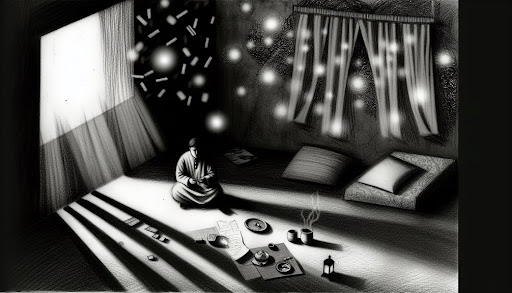Why Grief Feels Worse at Night
Grief transforms as daylight fades. The protective shield of daytime activities dissolves, leaving raw emotions exposed in the quiet hours. Research confirms this phenomenon—the brain’s regulatory systems weaken with evening fatigue, while memories intensify in darkness. Physical exhaustion compounds emotional vulnerability, creating the perfect conditions for sorrow to deepen. Many grieving individuals report this nocturnal amplification as a universal yet isolating experience. Understanding the neurological and psychological mechanisms behind nighttime grief offers essential insights for those traversing this painful terrain.
The Absence of Daily Distractions
When the sun sets and activity ceases, grief often intensifies as the buffer of daily distractions dissolves. The brain, no longer occupied with work, social interactions, or routine tasks, creates space for suppressed emotions to surface. Nighttime’s quietude becomes a canvas for memories and rumination.
Research indicates that cognitive fatigue at day’s end diminishes emotional regulation capabilities. The prefrontal cortex, responsible for emotional control, functions less efficiently when tired. Furthermore, darkness itself may trigger ancient survival mechanisms that heighten emotional sensitivity.
For many bereaved individuals, bedtime routines previously shared with the deceased become painful reminders of absence, transforming comfort rituals into moments of acute loss.

Our Brain’s Nighttime Processing Mode
While daytime grief manifests through conscious awareness, the brain enters a distinct neurological state during sleep that greatly affects how loss is processed. Nighttime neurochemistry shifts toward memory consolidation, with the prefrontal cortex—responsible for rational thinking—showing reduced activity.
Research demonstrates that during evening hours, the limbic system becomes more active, intensifying emotional experiences. Without the executive function’s regulatory control, grief can surface with heightened intensity. The brain’s natural nocturnal processing mode prioritizes emotional memory integration, inadvertently amplifying feelings of loss.
This neurological shift explains why is grief worse at night and many bereaved individuals report overwhelming grief waves before sleep, when the brain actively works to metabolize emotional experiences.
Physical Fatigue and Emotional Vulnerability
The physical toll of grief routinely compounds emotional vulnerability as daylight fades. Research shows that fatigue deteriorates cognitive defenses that normally regulate emotional responses. The body’s declining energy reserves by evening create a perfect neurological storm where emotional regulation becomes increasingly difficult.
This fatigue-vulnerability connection operates bidirectionally. Grief disrupts sleep patterns through cortisol dysregulation, creating a cycle where emotional pain causes physical exhaustion, which then amplifies emotional sensitivity. Studies demonstrate that even minor sleep deprivation considerably reduces emotional resilience.
For the bereaved, nighttime represents a convergence of physical depletion and emotional fragility—when the body lacks resources precisely when psychological defenses are most needed.
The Silence That Amplifies Loss
Nighttime silence creates an acoustic vacuum where thoughts of loss echo without competition from daytime distractions. The brain, no longer processing external stimuli, turns inward to unresolved emotional material. Research indicates this phenomenon activates the default mode network, associated with self-reflection and rumination.
For the bereaved, this silence becomes a canvas where memories project with heightened clarity. The absence of loved ones becomes palpable in empty rooms and unoccupied spaces. Psychologists note that this amplification effect often triggers paradoxical responses—seeking connection through old messages or photographs, yet feeling the separation more acutely when confronted with these remnants of relationship.
Bedtime Rituals and Painful Reminders
Bedtime rituals, once sources of comfort and change, transform into painful emotional landmines for those experiencing grief. The absent goodnight kiss, the empty side of the bed, or the missing bedtime conversation create profound voids in established routines.
Research shows these disruptions intensify grief responses. According to bereavement studies, the brain processes loss differently when fatigued, making nighttime particularly challenging for emotional regulation. Simple acts like turning down covers or setting an alarm become painful reminders of what’s been lost.
Therapists recommend gradually adapting rituals rather than abandoning them completely—creating new meaning while acknowledging the pain these alterations inevitably bring.
Strategies for Navigating Grief After Dark
How can those experiencing loss manage the intensified emotional burden that descends with darkness? Research suggests several evidence-based approaches. Establishing consistent sleep hygiene—fixed bedtimes, limited screen exposure, and calming routines—helps regulate circadian rhythms disrupted by grief. Mindfulness practices like guided meditation can redirect attention from rumination to present awareness.
Mental health professionals recommend externalizing nighttime thoughts through journaling or voice recordings. Creating physical comfort through weighted blankets or familiar scents may provide sensory grounding. For many, structured bedside rituals acknowledging the loss—lighting a candle or viewing a photograph—transform overwhelming feelings into manageable moments of remembrance.
(Contributed Content)








